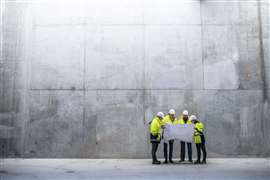African opportunities
18 March 2008
![]()
Africa is often overlooked as a construction market. It lacks the size of the North American and Western European markets and offers less robust growth than the rapidly expanding Asian and Latin American economies.
The issue is compounded by a lack of reliable construction data which makes measurement and forecasting difficult. Add to this relatively high economic and political risk, and news stories that accentuate political corruption and demographic strife, and it is not surprising that the region is under-represented in construction forums. However, there are opportunities and even improving conditions in certain countries on the continent which we shall explore here.
Tunisia
Starting on the northern coast, Tunisia has seen expanding economic growth over the past couple of years, and we expect strength to continue in 2007 and even into 2008 and 2009. According to the latest World Economic Forum Global Competitiveness Report, Tunisia is one of the most competitive of the African and Arab countries, which is not unexpected given the country's continued investment in human capital and large-scale institutional reforms.
Increased competitiveness, continued recovery in the tourism sector, strong performance in the transportation and telecommunications sectors, and a recovery in the secondary sector will be the main drivers of economic growth in the near and medium terms. The strong growth in the telecommunications sector will come from the government's efforts to make Tunisia's information and telecommunications sector the most developed of any Maghreb (North-west African) nation. this is reflected in a construction outlook which is quite strong across the board, but with a particular tilt in favour of infrastructure expansion.
Egypt
Egypt's construction sector is also driven in part by strong infrastructure spending, although in this case, it is due to a US$ 5 billion investment in expanding the Suez Canal. Indeed, it is healthy flows from strong Suez traffic that has helped boost Egypt's economy, although it has also benefited from a recovery in tourism and investments from Gulf investors looking for growth opportunities for their oil earnings.
Fitch Ratings has recently upgraded the outlook for the Egyptian economy to ‘positive’, indeed, Egypt is now a net creditor nation. The stronger economy and positive medium term outlook have stimulated residential investment, which Global Insight projects to be the construction growth leader over the forecast horizon.
Sub-Saharan
Turning to sub-Saharan Africa, Kenya is seen as a regional business and commercial hub, boasting the most dynamic economy in the East African region with an increasingly apolitical private sector and the least aid-dependent economy in the region. Despite some operational and security shortcomings that continue to present barriers to investment and business, the country still remains the destination of choice for multination businesses and tourists as well as international organisations looking for a regional presence.
Kenya's construction market is infrastructure led, driven both by the port of Mombassa, which serves as main entry point for goods for a number of landlocked countries surrounding Kenya, and by a robust energy policy that has boosted infrastructure spending and insulated Kenya from the power problems that have plagued its neighbours. Nevertheless, uncertainty surrounding corruption and an economy with a weather-dependent agricultural base will hold back residential investment.
South Africa offers perhaps the best operational and business environment in Africa, and one of the best in any country outside the developed world. South Africa has seen one of the world's fastest domestic inflation, although the rate of growth has slowed as mortgage rates have increased. Growth in the residential sector is expected to be kept alive, however, by growing demand from an up and coming black middle class.
At the same time, demand for non-residential property will increase with the continued construction boom. Demand for locally manufactured goods is strong on the back of government infrastructure spending plans, and the country is continuing to expand a world-class infrastructure, partly in response to hosting the soccer World Cup in 2010.
The result is a modern transportation system, low-cost and widely available energy, and sophisticated telecommunications systems. Even so, the economy continues to bump against capacity constraints with the result that Global Insight expects private non-residential spending to accelerate in the near and medium term.
The rate of increase in infrastructure spending will slow, but remain at levels strong by world and regional standards. Taking into account both growth opportunity and market size, South Africa is the best construction investment climate in Africa and one of the better ones in the world.
STAY CONNECTED


Receive the information you need when you need it through our world-leading magazines, newsletters and daily briefings.
CONNECT WITH THE TEAM










